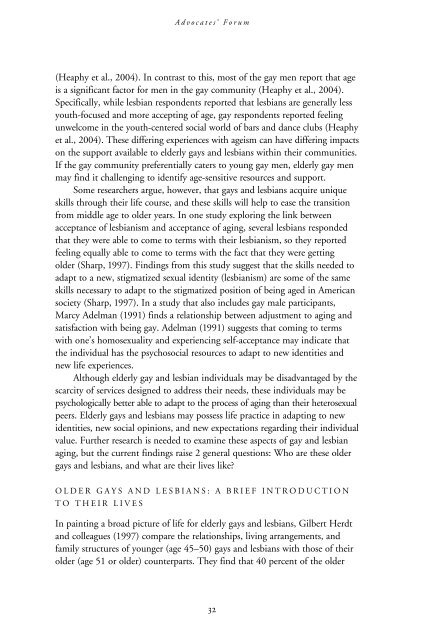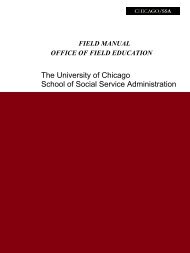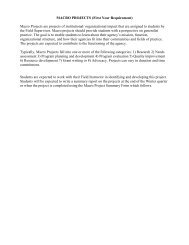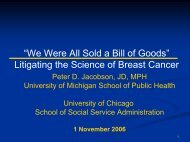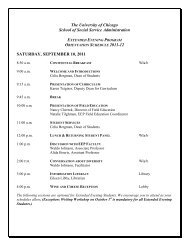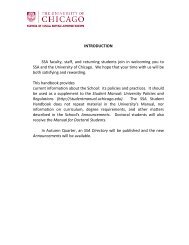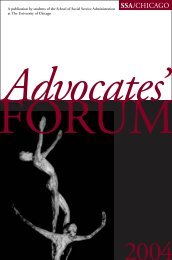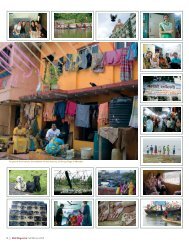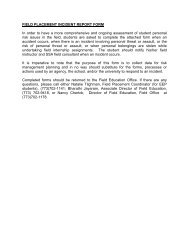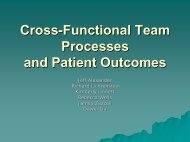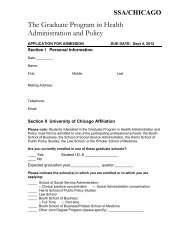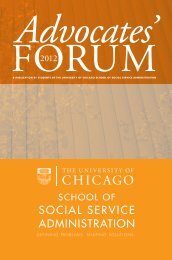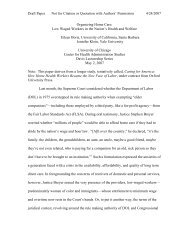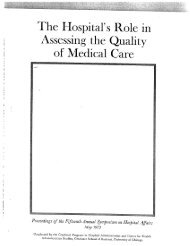2006 - School of Social Service Administration - University of Chicago
2006 - School of Social Service Administration - University of Chicago
2006 - School of Social Service Administration - University of Chicago
Create successful ePaper yourself
Turn your PDF publications into a flip-book with our unique Google optimized e-Paper software.
Advocates’ Forum<br />
(Heaphy et al., 2004). In contrast to this, most <strong>of</strong> the gay men report that age<br />
is a significant factor for men in the gay community (Heaphy et al., 2004).<br />
Specifically, while lesbian respondents reported that lesbians are generally less<br />
youth-focused and more accepting <strong>of</strong> age, gay respondents reported feeling<br />
unwelcome in the youth-centered social world <strong>of</strong> bars and dance clubs (Heaphy<br />
et al., 2004). These differing experiences with ageism can have differing impacts<br />
on the support available to elderly gays and lesbians within their communities.<br />
If the gay community preferentially caters to young gay men, elderly gay men<br />
may find it challenging to identify age-sensitive resources and support.<br />
Some researchers argue, however, that gays and lesbians acquire unique<br />
skills through their life course, and these skills will help to ease the transition<br />
from middle age to older years. In one study exploring the link between<br />
acceptance <strong>of</strong> lesbianism and acceptance <strong>of</strong> aging, several lesbians responded<br />
that they were able to come to terms with their lesbianism, so they reported<br />
feeling equally able to come to terms with the fact that they were getting<br />
older (Sharp, 1997). Findings from this study suggest that the skills needed to<br />
adapt to a new, stigmatized sexual identity (lesbianism) are some <strong>of</strong> the same<br />
skills necessary to adapt to the stigmatized position <strong>of</strong> being aged in American<br />
society (Sharp, 1997). In a study that also includes gay male participants,<br />
Marcy Adelman (1991) finds a relationship between adjustment to aging and<br />
satisfaction with being gay. Adelman (1991) suggests that coming to terms<br />
with one’s homosexuality and experiencing self-acceptance may indicate that<br />
the individual has the psychosocial resources to adapt to new identities and<br />
new life experiences.<br />
Although elderly gay and lesbian individuals may be disadvantaged by the<br />
scarcity <strong>of</strong> services designed to address their needs, these individuals may be<br />
psychologically better able to adapt to the process <strong>of</strong> aging than their heterosexual<br />
peers. Elderly gays and lesbians may possess life practice in adapting to new<br />
identities, new social opinions, and new expectations regarding their individual<br />
value. Further research is needed to examine these aspects <strong>of</strong> gay and lesbian<br />
aging, but the current findings raise 2 general questions: Who are these older<br />
gays and lesbians, and what are their lives like?<br />
OLDER GAYS AND LESBIANS: A BRIEF INTRODUCTION<br />
TO THEIR LIVES<br />
In painting a broad picture <strong>of</strong> life for elderly gays and lesbians, Gilbert Herdt<br />
and colleagues (1997) compare the relationships, living arrangements, and<br />
family structures <strong>of</strong> younger (age 45–50) gays and lesbians with those <strong>of</strong> their<br />
older (age 51 or older) counterparts. They find that 40 percent <strong>of</strong> the older<br />
32


